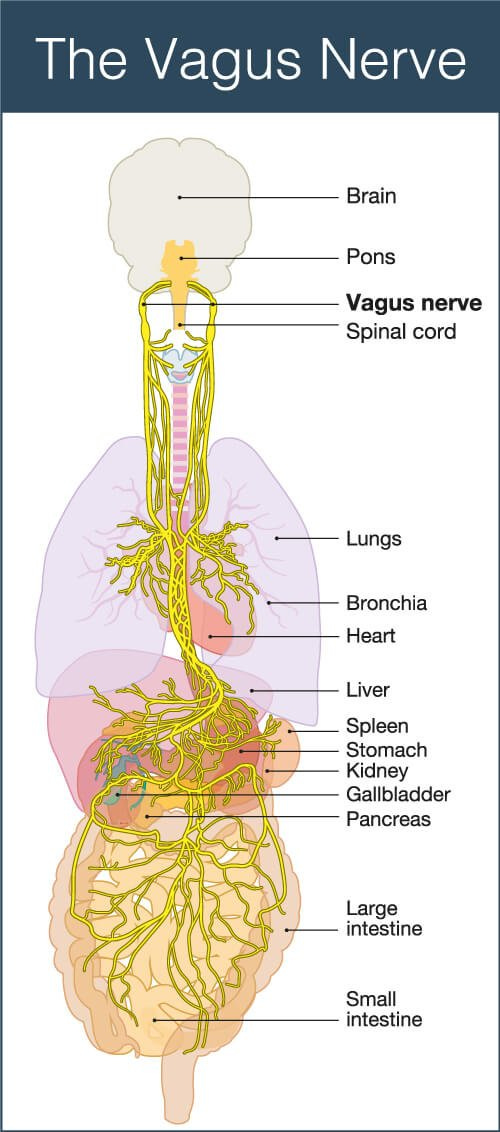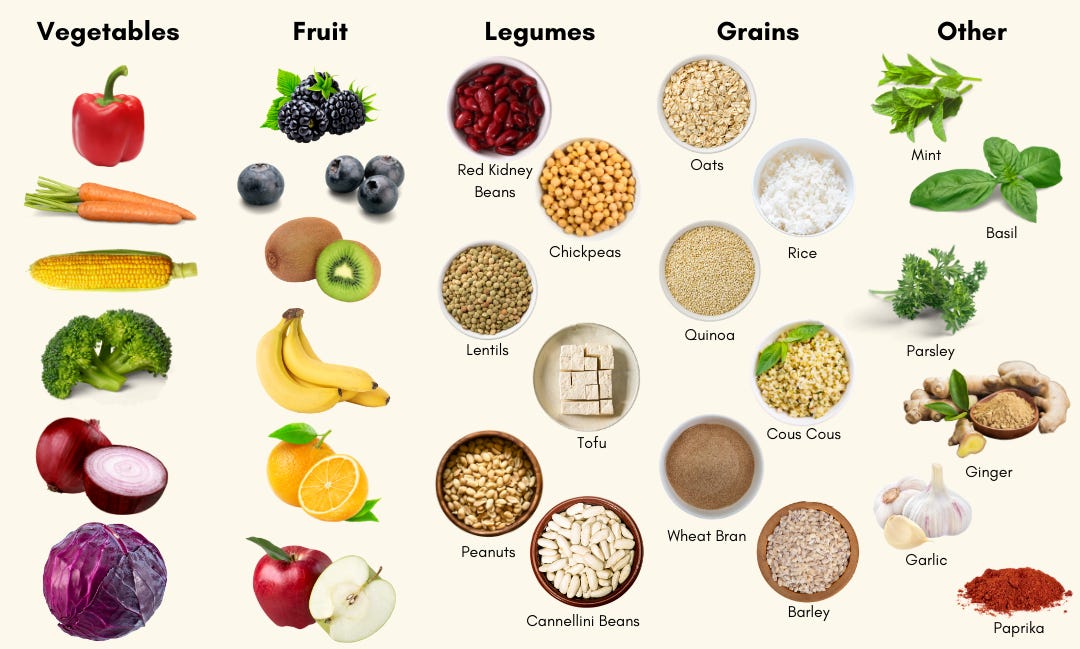Second Brain Sonata: Gut Microbiome's Melodic Tale
How to optimize your gut health to seamlessly flow in the river of life
Dear Prosperity Seekers,
Thank you very much for taking your precious time to complete the survey. It has given me invaluable insight into understanding which areas of your life prosperity is lacking. Based on your needs, I will present educational content that if implemented, can lead you to prosperity. I'd like to begin this article by requesting each of you to share my articles with your loved ones so that they too, can benefit from the knowledge I share on this platform and join us on our journey to prosperity.
We delved into the domain of intellectual prosperity in the previous edition by understanding the alterations we must make in our belief system in order to create a self-sustaining ecosystem known as prosperity. But to work on something, our physical bodies must be operating in optimum condition i.e., our bodies should be healthy and fit, with no room for any diseases or ailments. So that it can aid us not only in our "working hard" phase but also in our "playing harder" phase. I truly believe that learning about our bodies and understanding these biological operating mechanisms will eventually allow us to find ways to optimize our bodies. But, let us not begin this journey of physical prosperity by discussing the anatomy of the human body. First, let us investigate why trillions of microbes have found residence in our bodies. Why do they have a symbiotic relationship with our bodies? and Let us try to comprehend what can be done to enhance this relationship.
Symbiotic harmony: A balancing act
How you ever wondered why you feel there are butterflies fluttering in your stomach when you are nervous? or How the phrase “I have a gut instinct about this” is used to describe the reason behind illogical decisions. That’s because, the human body is an intricately woven tapestry of biological marvels, and one of its most essential and fascinating component is the gut microbiome. The gut is short for the gastrointestinal tract, which originates in the oral cavity of our body and ends at the anal orifice. The primary function of the gut is to break down the food we consume, absorb nutrients and dispose the waste products. The gut comprises trillions of microorganisms like bacteria, viruses and fungi forming a gut microbiome that plays a pivotal role in shaping our overall well-being. Quoting Dr. Justin Sonnenburg from Stanford University, "The gut microbiome is an integral part of human biology, impacting metabolism, immunity, and even brain function. Understanding its importance is essential for advancing personalized approaches to health". Hence this article delves into the origin, symbiotic nature, and profound impact of the gut microbiome on our holistic health.
The human gut microbiome begins its journey at birth, as a sterile digestive system gradually becomes populated with various microorganisms. The process of microbial colonization starts during vaginal delivery, with exposure to the mother's microbiota. Subsequently, environmental factors, genetics, and dietary habits contribute to the establishment of a unique and dynamic microbial ecosystem within the gastrointestinal tract.
The relationship between the host and the gut microbiome is a symbiotic dance, wherein both parties derive mutual benefits. The microbiome aids in the digestion and fermentation of food, produces essential vitamins and contributes to the development of a robust immune system. In return, the host body provides a nurturing environment with nutrients that sustain the diverse microbial community. Furthermore, the gut microbiome acts as a sentinel, defending against harmful pathogens and bolstering the integrity of the intestinal barrier. This delicate equilibrium is essential for maintaining homeostasis, ensuring optimal nutrient absorption, and preventing the proliferation of harmful microbes.
The Second Brain: A Neurological Nexus
The gut microbiome's influence extends beyond the realms of digestion and immunity; it intricately communicates with the central nervous system, earning its name as the "Second Brain". The gut-brain axis, a bidirectional communication network, involves the exchange of signals between the gut and the brain. These exchanges happen through mainly two types of connections:
The neural connection: The vagus nerve, a major component of the parasympathetic nervous system, acts as a communication highway between the gut and the brain. It transmits signals bidirectionally, influencing various bodily functions. Microbial activities in the gut produce compounds that influence the vagus nerve, impacting neurotransmitter release and immune responses. This intricate interplay significantly influences brain functioning, affecting cognitive abilities, mood regulation, and overall mental health.
Hormonal connection: Serotonin is a neurotransmitter and hormone that plays a crucial role in learning capabilities, memory, happiness, mood regulation, body temperature, appetite, and sleep. Approximately 95% of serotonin hormone is produced in the gut. Alterations in the gut microbiome composition have been linked to changes in serotonin levels. Imbalances in serotonin are associated with conditions like irritable bowel syndrome (IBS), depression, and anxiety.
Along with influencing our brain functioning and profoundly impacting our cognitive abilities, the gut also has a major say in building and bolstering our immune system.
Gut Guardians
The immune system is a complex network of cells, tissues, and organs that work together to defend the body against harmful pathogens. Its primary functions include recognizing and neutralizing foreign invaders and maintaining a memory of past infections for faster responses. Now let’s look at several mechanisms that illustrate the impact of the gut microbiome on immune function:
Immune Cell Activation: Gut bacteria stimulate the production and activation of various immune cells, including T-cells, B-cells, and macrophages. These cells are essential for effective immune responses.
Barrier Integrity: A healthy gut microbiome contributes to the maintenance of the intestinal barrier, preventing the entry of harmful substances and pathogens into the bloodstream. This barrier function is crucial for overall immune defence.
Metabolite Production: Gut microbes produce metabolites, such as short-chain fatty acids, that influence immune cell function and inflammation. These metabolites can have systemic effects on immune responses.
We've learned a lot about the gut microbiome and the critical role it plays in keeping us happy, healthy, and smart. Let us now examine all of the steps we can take to maintain a thriving diverse microbiome in our gastrointestinal tract. Ms Sophie Medlin, Chair of the British Dietetic Association in London, has suggested the following few general rituals we should practice in order to nourish a healthy gut microbiome and things we must not do to cause detrimental effects on our gut microbiome.
Five Things to Do for a Healthy Gut Microbiome:
1. Diverse Diet: Consume a varied and fibre-rich diet that includes fruits, vegetables, whole grains, and legumes. This provides essential nutrients for both you and your gut microbes, promoting diversity within the microbiome. Leading gastroenterologists recommend consuming up to 30 different types of plants per week and a minimum of 30 grams of fibre per day.
2.Probiotics and Fermented Foods: Integrate probiotic-rich foods like yoghurt, kefir, sauerkraut, and kimchi into your diet. These contain beneficial bacteria that can enhance the diversity and balance of your gut microbiome.
3. Prebiotic Foods: Include prebiotic-rich foods such as garlic, onions, bananas, and asparagus. Prebiotics are non-digestible fibres that serve as food for beneficial gut bacteria, promoting their growth and activity.
4. Adequate Hydration: Maintain proper hydration, as water is essential for overall health, including the well-being of your gut. Water helps transport nutrients to your cells and aids in the elimination of waste products.
5. Regular Exercise: Engage in regular physical activity, as it has been linked to a more diverse gut microbiome. Exercise promotes a favourable environment for beneficial microbes and contributes to overall gut health.
Five Things to Avoid for a Healthy Gut Microbiome:
1. Excessive Antibiotic Use: Limit unnecessary antibiotic use, as these medications can disrupt the balance of gut bacteria. If antibiotics are unavoidably prescribed, follow the recommended course and consider probiotic supplementation afterwards.
2. Reduce high Sugar and Processed Foods: Reduce the intake of refined sugars and highly processed foods. These can negatively impact the gut microbiome by promoting the growth of less beneficial bacteria and contributing to inflammation.
3. Chronic Stress: Manage stress through practices like meditation, yoga, or deep breathing exercises. Chronic stress can alter the composition of the gut microbiome and compromise its health.
4. Overuse of Disinfectants: Avoid excessive use of antibacterial soaps and disinfectants, as they may eliminate not only harmful bacteria but also beneficial ones. Maintain good hygiene without disrupting the natural microbial balance.
5. Lack of Sleep: Prioritize sufficient and quality sleep. Sleep deprivation can affect the gut microbiome, leading to imbalances. Aim for 7-9 hours of restful sleep per night to support overall health, including your gut.
Hypothetically, if our gut microbiome could communicate with us, it would undoubtedly say, "Please nurture me so that I can protect you and make you more robust".
This edition of Prosperity.edu explained why you should focus on nurturing your gut microbiome and how you can improve your physical health simply by eating right and making certain lifestyle changes. I hope it was informative, and I wish you could personalize and implement these lifestyle changes in your lives. I am well aware that this edition was a little too scientific for some of you. But I promise that the next edition will be less technical and will give you practical advice on how to monitor, regulate, and condition your thoughts and feelings in order to live an emotionally prosperous life.
Stay tuned to prosper.
If this content has educated you and you still haven’t subscribed to my newsletter please click on the subscribe button below and subscribe by pledging for free:
If you have subscribed, but do not know the purpose of this newsletter, please click on the below link to read the first post:
If you have subscribed, and know the purpose of this newsletter but have not completed the survey, I would humbly request you to complete the survey by clicking on the link below:
References -
How the microbiome affects your health and ways to optimise it ; Dr Erica & Justin Sonnenburg
“The gut-brain axis: interactions between enteric microbiota, central and enteric nervous systems”. Marilia Carabotti et.al
“The Gut-Brain Axis: Influence of Microbiota on Mood and Mental Health”. Jeremy Appleton.
“Conditioning of the immune system by the microbiome”. Ramnik J. Xavier et.al
Heal Your Brain: How Your Gut Secretly Controls Your Brain Health – Dietitian Sophie Medlin











